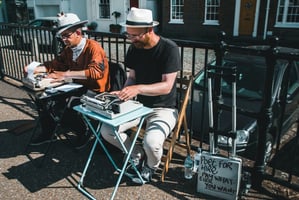Being an Introvert is Seen as a Weakness- Why That is Complete Bullshit

I’m an introvert. Occasionally, with enough alcohol or a topic I am passionate about, I can be coaxed out of my shell. But, for the most part, I actively avoid direct engagement- especially in person.
I’ve often been envious of my friends and colleagues who can strike up a conversation with anyone. I feel like everyone loves them and wants to be around them. Meanwhile, here I am on Travis Island.
I often ask myself, “why can’t I be more extroverted?” Which is usually followed by, “why do I even care?”
I don’t know if it stems from the childhood mantra that was driven into my head that “children should be seen and not heard,” or from experiences that led to embarrassment.
Embrace Your Introvertedness- It’s Who You Are
Whatever the reason, it’s who I am now, and it’s difficult to change. In fact, I don’t want to change it.
For a long time, I viewed my silence as a weakness. This was further exacerbated when I was at Microsoft. I felt like part of my regular evaluation was based on speaking up during meetings – even if you really didn’t have anything of value to add.
You would get points for just opening your mouth and regurgitating what had already been said. Maybe use a few more corporate buzzwords to make people think you were smart and knew what you were talking about.
Through this experience, even though I was graded as if it were a weakness, I realized how much of a strength it was.
I Wasn’t Born an Introvert
I often think about the times I had been eager to share with my Dad what I had recently read about as a kid, only to be met with “Travis, you’re wearing me out with this stuff.”
I loved to learn. I was fascinated by the world around me. There were so many things to uncover. So many edges to explore. I was particularly fascinated with plants and animals. Living in a rural area, I could go out my backdoor and canvas the local lakes, streams, and woods for specimens I had just learned about.
But, over time, I began to be quiet. To keep what I learned to myself. I didn’t think people cared. I certainly didn’t want to “wear anyone out.”
Turning a “Weakness” into a Superpower
This would eventually lead to developing a skill or what many people now like to refer to as a “superpower.”
It’s no superpower. I can promise you that. It took years to hone and develop, and it’s not something I was born with.
What I’m talking about is the power of observation. When everyone else is opening their mouths, I began to learn that they’re providing signals and insight into how they think, what motivates them, and what they’re insecure about. Most of the time, they don’t even realize they’re doing this.
By being quiet and simply observing, you can see how people interact with each other. Where there is tension and where there is a bond.
You begin to see alliances that have formed. You begin to see who has influence – and who doesn’t.
Most importantly, you can begin to read between the lines.
Sometimes I’ve wished that I didn’t have this ability. That I could be encapsulated in an “ignorance is bliss” world.
Because it’s made me angry to really see what was going on.
That was then. This is now.
How Being an Introvert Can Advance Your Career
Let me tell you why this ability is so valuable.
Two words: empathy and leadership.
I believe you can’t be a great leader without being empathetic, and you can’t be empathetic if you’re not observant.
Four years ago, I landed my first leadership role. After 18 years of being an individual contributor, I became responsible for a team of 7 people.
This was scary, and I dove into learning from other leaders- I observed the President of the company who I could tell was well-loved and respected, and I read a ton. I also completed a certificate program from the University of Notre Dame in leadership and management.
That’s just what I do. I’m a voracious learner. That hasn’t changed since I was a kid.
I realized that my biggest strength, my ability to observe, would help me the most.
I would watch body language. I would listen, not only to the words people were saying but how they were saying it.
I also administered the Gallup Strengths Finder 2.0 to my team about six months into my role.
I wanted to know what made the people on my team tick and where they would excel.
As a result, I moved people on my team into roles more tailored to their strengths.
By being observant, I see issues early and address them before they fester into something much more complex and challenging to manage.
I’ve been able to advise different leaders in the company of what I’m seeing. Things they may be too close to the situation to see.
All of this because I sit there during meetings and observe and listen.
When You Finally Realize, Being an Introvert Works
There have been times, during a meeting, that the President of the company has said, “Travis, you’ve been sitting there quietly. What are your thoughts?”
When I was asked to speak, I now had more context and more value to add after listening to what everyone else had to say. I could process the different angles, pull it together, and bring to light things that may have been overlooked had I actively engaged in the conversation for the sake of being heard.
Nowadays, I’m thankful for the meeting chatterboxes- the ones who talk to be heard. Because I can see how what they say resonates (or doesn’t) with the people in the room. I can identify what’s missing or overlooked, and I can provide insight from a 30,000-foot view.
I’ve been in my current role for over four years. My silence has never been seen as a weakness. In fact, the President will often ask me what I’m seeing when it comes to different situations and projects.
Being the quiet one is a strength. Not a weakness. If anyone ever tries to convince you otherwise, especially a manager, it may be time to begin looking elsewhere.
In fact, I would say it is much more advantageous to your career to be observant and a great listener than it is to try to prove how much you know to a room of people that really don’t care.
Photo by Katherine Chase on Unsplash
</div<></figure</div
-1.png?width=400&height=100&name=Website%20Logo%20-%20400x100%20(transparent%20background)-1.png)


